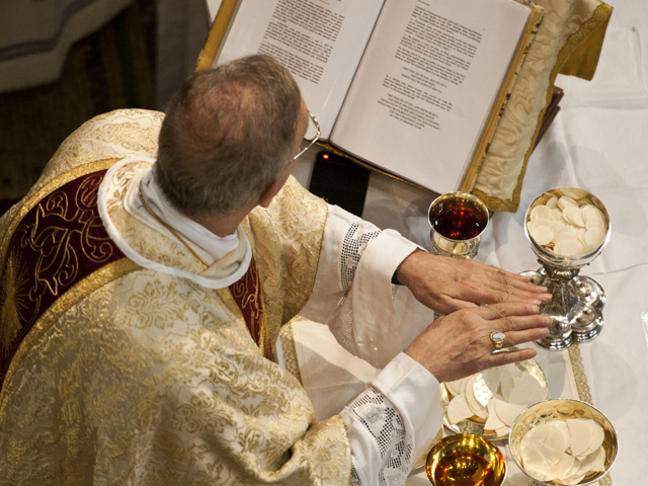
Christianity is not fit for the world. It is not suited to maintain the world’s political and economic structures and practices. But, neither, on the other hand, are the systems we have self-sustaining.
Long governments are few in the history of the world. The Old Testament calls for debt forgiveness on a ‘global scale’ every fifty years – in a way that happens despite the intentions of men. This fifty-year forgiveness was referred to as the Jubilee Year in Leviticus (25:8-13). When you look back on the histories of nations, how many times have natural and man-made calamities done just that? So, if Christianity’s practicality is set against actual events in the world, the actual life of nations, it would probably be found to fare no worse as a political or economic theory than any of the others. After all, few monasteries have ever suffered from internal revolution.
Monastic life is about as close as one gets to a Christian type of society – perhaps with one exception, the family. Of course, the two have a lot in common, practically everything.
Economic conditions create politics and morality. Not de jure, but de facto, as they say: not by force of right, but in fact. Women can be educated, stop their fertility and be present in the work force, therefore they should – that is how the world operates. If it can be done, it should be done. Is that reasonable? Few ever stop to ask. Now we send our kids to daycare and schools even in the first year of their lives, and consider this normal and therefore good. But are these practices sustainable and healthy? Evidently, we are willing to take the chance.
How we spend our time and make our money deeply influences how we think about right and wrong. In the lives of most people, right takes its place way behind pragmatic factors. I have seen it again and again. I have mentioned before how many so-called Catholic institutions have a hard time with basic Christian conduct. It’s very common now to import the practices of the business world into the Church. For instance, twice I have been escorted off the premises of places where my employment had terminated. One of these was a church and the other a ‘Catholic’ school! I have never been convicted of or even accused of a crime. But I certainly felt like a criminal then. My brother who has worked in the higher echelons of the banking industry has indicated to me that this is customary in his industry. But why has it become customary among Catholics, in presumably Church and quasi-ecclesiastical settings? It has become so because this is the majority of people’s frame of reference for how one behaves professionally, and who doesn’t want to be professional?
Stuff like this makes you wonder whether the Quakers and the Mennonites had it right. Well, we had it right before them, that is to say, in our particular versions of non-conformism, called monasticism. The founder of Western Monasticism, St. Benedict, was your quintessential non-conformist. He specifically left ‘city-life’ because he found it offensive. I say ‘city-life’ here rather than the ‘world’ or the ‘ways of the world,’ because these terms don’t tend to get us thinking about the actual things in the world that are objectionable. They are too theoretical. I bet that when Benedict left the city he could give you a whole list of he things that disgusted him, which he felt he could no longer be around. I bet he wouldn’t have said something so non-confrontationally general as ‘the world.’ The world doesn’t bother me, nor should it bother any Christian. Specific wicked practices in the world should bother us. Yes, and listing them will make people uncomfortable. These wicked these are so prevalent, prominent and deeply imbedded, that they compromise all of us.
Catholics are caught in a funny type of discourse when it comes to criticizing the politics and economics of the world. We believe in sharing – but what does that make us, socialists or libertarians? My simple answer is, neither. Those are terms that are used to refer to a whole package of things. Catholicism is a whole way of life, a whole big package of things too, which cannot be fit into the politics of the world. In other words, it doesn’t coincide with either socialism or libertarianism. Nor is it a ‘close-enough fit’ with either one of these things. So what are we supposed to do – say nothing, because our words will be taken in a way that we do not intend? ‘Catholics believe in sharing’ leads many to believe that we advocate a kind of left-wing welfare economic position. ‘Catholics believe abortion is wrong’ leads many to classify us as socially conservative. But social conservatism is a very fluid thing. Its meaning changes with every generation. Does it imply slavery and racial segregation? If so, that is not us.
Some people think that ours used to be a Christian society and that it is no longer. Of course, the influence of Christianity used to be stronger than it is now, but no culture—I will say again—but that of the monastery and the Catholic family, were ever Christian societies. Societies, political parties, laws can be Christian-ish, but this doesn’t mean that Christianity can fit in very well into a way of life such as predominates today.
You’re not going to hear the last word on any of this from me here. My message is a very simple one: the consequences of Christian discipleship are meant to run very deeply, and the consequences of being heavily invested in the life of the world also run very deeply. The Catholic who votes pro-life, gives his excess to cancer research, goes to mass on Sunday, is, despite all of that, if only that, a very superficial one indeed.

Colin wrote this Article for the Knights of the Holy Eucharist. He has been married to Anne-Marie since 1999, and they are proud to raise their six children, in a small town in Ontario, Canada. Colin has a PhD in Theology and works tirelessly to promote the Gospel. “Just share the Word,” is what he believes the Lord says to him – and so he does. He recently founded The Catholic Review of Books, a printed journal and website dedicated to “all things books” from the perspectives of faithful Catholics. He is fascinated by the concept of chivalry as it applies to being a man and a father in today’s crazy world.



